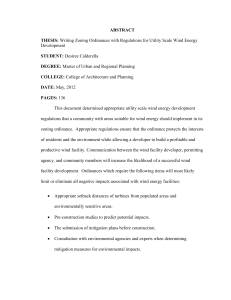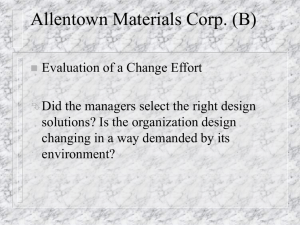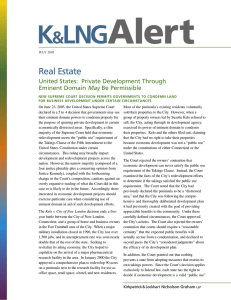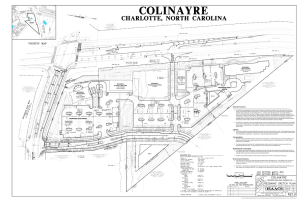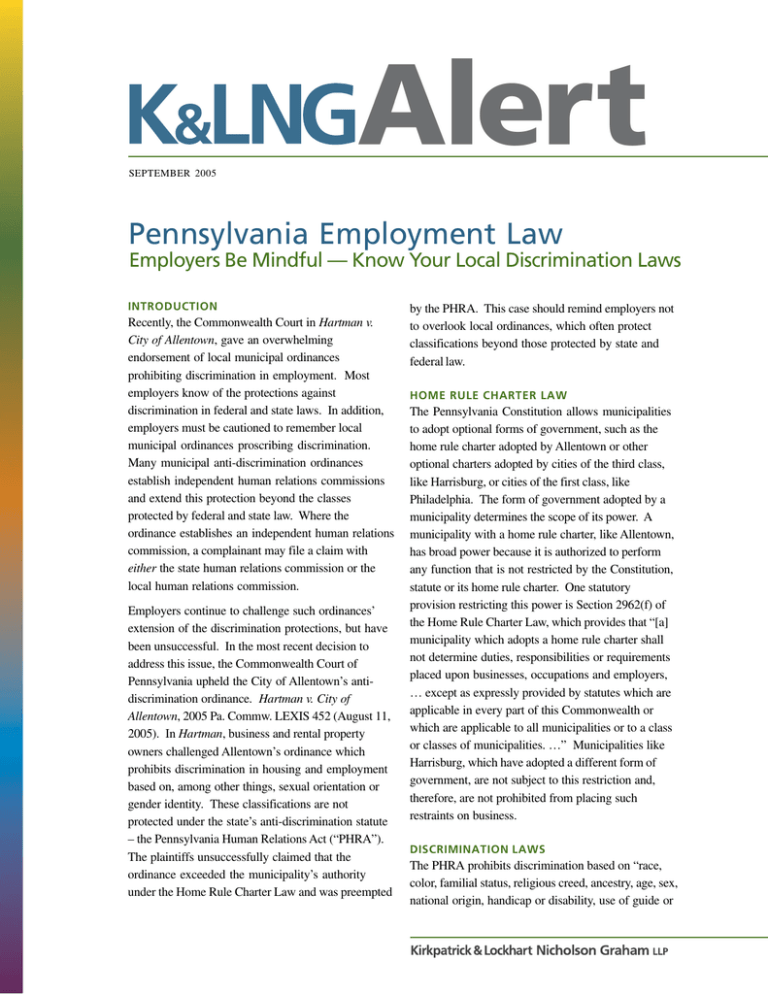
SEPTEMBER 2005
Pennsylvania Employment Law
Employers Be Mindful — Know Your Local Discrimination Laws
INTRODUCTION
Recently, the Commonwealth Court in Hartman v.
City of Allentown, gave an overwhelming
endorsement of local municipal ordinances
prohibiting discrimination in employment. Most
employers know of the protections against
discrimination in federal and state laws. In addition,
employers must be cautioned to remember local
municipal ordinances proscribing discrimination.
Many municipal anti-discrimination ordinances
establish independent human relations commissions
and extend this protection beyond the classes
protected by federal and state law. Where the
ordinance establishes an independent human relations
commission, a complainant may file a claim with
either the state human relations commission or the
local human relations commission.
Employers continue to challenge such ordinances’
extension of the discrimination protections, but have
been unsuccessful. In the most recent decision to
address this issue, the Commonwealth Court of
Pennsylvania upheld the City of Allentown’s antidiscrimination ordinance. Hartman v. City of
Allentown, 2005 Pa. Commw. LEXIS 452 (August 11,
2005). In Hartman, business and rental property
owners challenged Allentown’s ordinance which
prohibits discrimination in housing and employment
based on, among other things, sexual orientation or
gender identity. These classifications are not
protected under the state’s anti-discrimination statute
– the Pennsylvania Human Relations Act (“PHRA”).
The plaintiffs unsuccessfully claimed that the
ordinance exceeded the municipality’s authority
under the Home Rule Charter Law and was preempted
by the PHRA. This case should remind employers not
to overlook local ordinances, which often protect
classifications beyond those protected by state and
federal law.
HOME RULE CHARTER LAW
The Pennsylvania Constitution allows municipalities
to adopt optional forms of government, such as the
home rule charter adopted by Allentown or other
optional charters adopted by cities of the third class,
like Harrisburg, or cities of the first class, like
Philadelphia. The form of government adopted by a
municipality determines the scope of its power. A
municipality with a home rule charter, like Allentown,
has broad power because it is authorized to perform
any function that is not restricted by the Constitution,
statute or its home rule charter. One statutory
provision restricting this power is Section 2962(f) of
the Home Rule Charter Law, which provides that “[a]
municipality which adopts a home rule charter shall
not determine duties, responsibilities or requirements
placed upon businesses, occupations and employers,
… except as expressly provided by statutes which are
applicable in every part of this Commonwealth or
which are applicable to all municipalities or to a class
or classes of municipalities. …” Municipalities like
Harrisburg, which have adopted a different form of
government, are not subject to this restriction and,
therefore, are not prohibited from placing such
restraints on business.
DISCRIMINATION LAWS
The PHRA prohibits discrimination based on “race,
color, familial status, religious creed, ancestry, age, sex,
national origin, handicap or disability, use of guide or
support animals because of the blindness, deafness or
physical handicap of the user or because the user is a
handler or trainer of support or guide animals.”
Section 2(a) of the PHRA, 43 P.S. § 952(a).
Allentown’s ordinance expands these protected
categories to include sexual orientation and gender
identity. In its entirety, the ordinance makes it
unlawful to discriminate based on “[r]ace, color,
religion, national origin, ancestry or place of birth, sex,
gender identity, sexual orientation, disability, marital
status, familial status (in housing only), age or use of a
guide or support animal because of blindness, deafness
or physical disability of any individual ... or because
of the disability of an individual with whom the
person is known to have an association.” Codified
Ordinances of the City of Allentown, Article 181,
§ 181.02. Allentown’s ordinance is not unlike the
ordinances of other municipalities in Pennsylvania.
For example, Harrisburg, Philadelphia, Lancaster, York,
Scranton, Erie County and Pittsburgh currently have
similar ordinances that prohibit employment
discrimination based on sexual orientation and/or
gender identity.
HARTMAN V. CITY OF ALLENTOWN
A. ORDINANCES NOT PROHIBITED BY HOME RULE
CHARTERS
In Hartman, the Commonwealth Court noted the
anomaly that would result if some municipalities
could enact anti-discrimination ordinances while
municipalities that adopted the home rule, which is
designed to grant broad powers to the municipality,
were prohibited from doing so. The court prevented
such a result by reading the Section 2962(f) restriction
narrowly. It ruled that this limitation on a home rule
municipality’s regulation of business applies only to
the imposition of affirmative duties on businesses.
Unlike ordinances requiring businesses to take certain
action, the City of Allentown’s ordinance simply seeks
to protect citizens from discrimination. Therefore,
Section 2962(f) did not prevent the City of Allentown
from enacting the anti-discrimination ordinance.
A case challenging an ordinance in Philadelphia, a
city of the first class not governed by the Home Rule
Charter Law, also lends support for upholding such an
ordinance in Allentown and in non-home rule
municipalities. See Devlin v. City of Philadelphia,
862 A.2d 1234 (Pa. 2004). In Devlin, the Pennsylvania
Supreme Court recognized that Philadelphia could
2 SEPTEMBER 2005
prohibit discrimination based on sexual orientation. It
explained that the authority to enact antidiscrimination ordinances derives from the
municipality’s police powers. Through its police
powers, municipalities can maintain vitality and order
in response to changing social, economic and
political conditions. Commonwealth Court applied
this reasoning to conclude that Allentown’s antidiscrimination ordinance was a permissible exercise of
police power.
B. ORDINANCES NOT PREEMPTED BY STATE
DISCRIMINATION LAW
The court then addressed the issue of preemption,
which is based on the principle that, as an agent of the
state, a municipality cannot act contrary to the state.
Challengers claimed that the PHRA preempted
Allentown’s ordinance. In deciding this preemption
challenge, the court was faced with a decision that
promised to have wide-ranging implications for
municipalities across the Commonwealth that have
adopted anti-discrimination ordinances.
Because of the potential impact of the decision, the
Pennsylvania Human Relations Commission
(“PHRC”) participated in the case as a “friend of the
court.” PHRC took the position that the PHRA does
not preempt Allentown’s ordinance. PHRC explained
that local anti-discrimination ordinances are
consistent with the purpose of the PHRA and the
public policy in Pennsylvania to eliminate the evils of
discrimination. Additionally, the PHRA neither
expressly nor implicitly preempts protection based on
sexual orientation or gender identity. The court gave
deference to the position advanced by PHRC as the
sole agency in charge of interpreting and enforcing
the PHRA.
Accordingly, the Commonwealth Court concluded
that the PHRA does not preempt local legislation. It
found that there is no inherent conflict between
Allentown’s ordinance and the PHRA; enforcement of
the PHRA is not impeded by the ordinance’s
prohibition on additional categories of
discrimination; and the PHRA was not intended to be
exclusive legislation in the field of antidiscrimination. In fact, the PHRA expressly provides
that political subdivisions may establish local human
relations commissions with powers and duties similar
to those of the PHRC. The court also took this
KIRKPATRICK & LOCKHART NICHOLSON GRAHAM LLP
opportunity to clarify earlier precedent and reiterate
the proposition that a municipality “generally has
authority to enact anti-discrimination laws pursuant to
its police powers.”
CONCLUSION
Employers should be aware of local ordinances that
may affect their employment policies and practices.
More and more municipalities are enacting ordinances
and expanding anti-discrimination protection. As the
court noted, ordinances prohibiting employment
discrimination based on sexual orientation or gender
identity are consistent with expanding protection for
these classifications in other areas, such as
Pennsylvania hate crimes legislation. Municipalities
may also choose to designate other protected
classifications such as marital status, genetic
predisposition or carrier status, military service,
possession of a GED, height, weight or other
characteristics. Depending upon the municipality in
which each employer is located, as municipalities
expand anti-discrimination protection in employment,
compliance with only state and federal law may not be
enough.
Amy L. Groff
agroff@klng.com
717.231.5876
Jacqueline Jackson-DeGarcia
jjacksondegarcia@klng.com
717.231.5877
If you have questions or would like more information about K&LNG’s Employment and Labor practice,
please contact one of our lawyers listed below:
Boston
Henry T. Goldman
Mark D. Pomfret
617.951.9156
617.261.3147
hgoldman@klng.com
mpomfret@klng.com
Dallas
Jaime Ramón
214.939.4902
jramon@klng.com
Harrisburg
Carleton O. Strouss
717.231.4503
cstrouss@klng.com
London
Paul Callegari
+44.20.7360.8194
pcallegari@klng.com
Los Angeles
Thomas H. Petrides
Paul W. Sweeney, Jr.
310.552.5077
310.552.5055
tpetrides@klng.com
psweeney@klng.com
Miami
April L. Boyer
Carol C. Lumpkin
Michael C. Marsh
305.539.3380
305.539.3323
305.539.3321
aboyer@klng.com
clumpkin@klng.com
mmarsh@klng.com
Newark
Rosemary Alito
Vincent N. Avallone
Marilyn Sneirson
973.848.4022
973.848.4027
973.848.4028
ralito@klng.com
vavallone@klng.com
msneirson@klng.com
New York
Eva M. Ciko
212.536.3905
eciko@klng.com
Palo Alto
Linda L. Usoz
650.798.6702
lusoz@klng.com
Pittsburgh
Stephen M. Olson
Michael A. Pavlick
Hayes C. Stover
412.355.6496
412.355.6275
412.355.6476
solson@klng.com
mpavlick@klng.com
hstover@klng.com
San Francisco
Jonathan M. Cohen
415.249.1029
jcohen@klng.com
Washington
Lawrence C. Lanpher
202.778.9011
llanpher@klng.com
www
w.. k l n g . c o m
BOSTON DALLAS HARRISBURG LONDON LOS ANGELES MIAMI NEWARK NEW YORK PALO ALTO PITTSBURGH SAN FRANCISCO WASHINGTON
n
n
n
n
n
n
n
n
n
n
n
Kirkpatrick & Lockhart Nicholson Graham LLP (K&LNG) has approximately 950 lawyers and represents entrepreneurs, growth and middle market companies, capital markets participants, and
leading FORTUNE 100 and FTSE 100 global corporations nationally and internationally.
K&LNG is a combination of two limited liability partnerships, each named Kirkpatrick & Lockhart Nicholson Graham LLP, one qualified in Delaware, U.S.A. and practicing from offices in
Boston, Dallas, Harrisburg, Los Angeles, Miami, Newark, New York, Palo Alto, Pittsburgh, San Francisco and Washington and one incorporated in England practicing from the London office.
This publication/newsletter is for informational purposes and does not contain or convey legal advice. The information herein should not be used or relied upon in regard to any particular
facts or circumstances without first consulting a lawyer.
Data Protection Act 1988 - We may contact you from time to time with information on Kirkpatrick & Lockhart Nicholson Graham LLP seminars and with our regular newsletters, which may be
of interest to you. We will not provide your details to any third parties. Please e-mail cgregory@klng.com if you would prefer not to receive this information.
© 2005 KIRKPATRICK & LOCKHART NICHOLSON GRAHAM LLP. ALL RIGHTS RESERVED.



